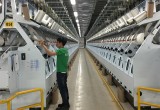Development of the southern key economic region needs new impetus
In the morning of May 6, in Dong Nai province, the conference for the development of the Southern key economic region was first organized under the lead of Prime Minister Nguyen Xuan Phuc and many leaders of the Government and ministries, sectors, provinces, cities in the region. At the conference, the Government, ministries, branches and experts all said that if the Southern key economic region is to develop quickly and sustainably, being the economic engine of the whole country, the regional development perspective must be agreed. is an organic development, linking between provinces.
Remove problems, create new impetus for development
According to the report of the Ministry of Planning and Investment, the Southern key economic zone consists of 8 provinces and cities (Ho Chi Minh City, Binh Duong, Dong Nai, Binh Phuoc, Tay Ninh, Ba Ria - Vung Tau and Long An, Tien Giang) accounts for 40% of the country's GDP, collecting over 42% of the country's total budget revenue and accounting for 40% of the country's total export turnover. However, in fact, the region is facing difficulties in maintaining growth when the growth rate of the region starts to slow down, the average growth rate in 2016-2018 is only equal to the growth rate is 6.61% (the period of 2011-2015 is 1.5 times higher than the national growth rate). The proportion of the two key industries of the region is industry-construction and services are declining (in 2018 the industry sector decreased by 0.52%, the service sector decreased by 2.88% compared to 2016).

Prime Minister Nguyen Xuan Phuc delivered a speech at the Conference on developing the Southern key economic region held on May 6 in Dong Nai. Photo: Khanh Vinh

My Phuoc - Tan Van Street plays an important role connecting Binh Duong with the Southern key economic region. Photo: Phuong Le
For the industry of the region, there are no new products with high levels of gray matter, high technology, high value-added content, making up a large proportion to create a driving force for the growth of regional industrial production. Meanwhile, although the total export turnover of the region in 2018 reached 199.4 billion USD, the trade deficit was 0.2 billion USD. Provincial competitiveness index (PCI) and Provincial Governance and Public Administration Performance Index (PAPI) are not high in the region. Along with that, although the number of enterprises in the region is at the top of the whole country, the average registered capital is still low, 11.2 billion VND an enterprise (the Red River Delta region is 13 billion VND an enterprise); the speed of attracting foreign investment (FDI) and the scale of FDI projects decreased, the quality of human resources was improved but still slow compared to the requirements of the 4th industrial revolution.
In addition to the positive results achieved, according to Deputy Prime Minister Trinh Dinh Dung, the Southern key economic region is also facing great difficulties and challenges that need to be overcome soon. Specifically, the implementation of the leading goal in the development of advanced manufacturing and service industries, especially the electronic components manufacturing, software production, high-tech development, investment in research development, development of commercial, logistics and telecommunications services ... with quality, efficiency and international competition have not achieved the desired results and unclear. The development among localities in the region also has a high disparity, especially the infrastructure system and services leading to the trend of population movement to the central cities, especially Ho Chi Minh City, has put great pressure on the urban infrastructure system, affecting the sustainable development of the Ho Chi Minh City region.
Developing regional mechanisms and policies
Speaking at the conference, Deputy Prime Minister Vuong Dinh Hue stated, with high growth, leading in industrialization and modernization of the country, Ho Chi Minh City is "the leader of the locomotive, the driving force of motivation to develop the country ”is indisputable. However, in the general context, the Southern Key Economic Region is also facing the risk of declining and maintaining the leading role of growth, especially to ensure faster and more sustainable growth.
In order to do this, Deputy Prime Minister Vuong Dinh Hue emphasized: The efforts of each locality in the region are not enough, there must be collective action as regional association. The Government ensures the planning of socio-economic development of high quality areas, especially socio-economic infrastructure planning, including transport, irrigation, energy, telecommunications, logistics, culture and education. . In particular, the Government will focus on detailed planning on transportation, not based on the advantages of each locality but based on the comparative advantages of each locality.
“Through practical surveys in localities and Dong Nai province impatiently want to invest in connecting infrastructure with Ho Chi Minh City, but Ho Chi Minh City is normal. Binh Duong province impatiently wants to connect with Dong Nai but Dong Nai feels unimportant. ”, Leading to inadequate reality in infrastructure investment in this area, Deputy Prime Minister Vuong Dinh Hue asked the regional council to" sit back ". arranged into a list of priority, regional-linked projects. Based on this list, the Government and related agencies will allocate reserve funds for medium-term public investment in 2016-2020 and supplement the source during the upcoming public investment period to invest.
From another perspective, Deputy Prime Minister Trinh Dinh Dung said that the development among localities in the region also has high disparities, especially infrastructure and services ... leading to the trend of population movement about Central cities, especially Ho Chi Minh City, have put great pressure on the urban infrastructure system, affecting the sustainable development of the Ho Chi Minh City region. Meanwhile, the infrastructure system, especially the transport infrastructure, the investment infrastructure, which does not meet the development needs, has greatly influenced the development and the division of cooperation among localities. in the region. Regarding state management, regional coordination mechanism, especially the assignment of cooperation among localities in the region still faces many difficulties in development investment in sectors, fields, infrastructure development and management. resources ... In addition, specific mechanisms and policies for regional development that have not been studied appropriately have affected regional link development.
Mr. Nguyen Thanh Phong, Chairman of Ho Chi Minh City People's Committee said that, as a leading force, the city proposed that the Central Government should complete a strong legal system on the region, the legal system regulating the locality. suitable to complete regional institutions ... in the immediate future, the city proposes to the Government to prioritize the allocation of state budget capital and official development assistance (ODA) for the construction of key traffic works, concentrating capital on planning, building and developing inter-regional logistics systems.
Speaking at the conference, Deputy Prime Minister Vuong Dinh Hue also pointed out that in the regional association, the State and businesses have their own jobs to build in institutions and mobilize resources for development. For corporate responsibility in regional links, Deputy Prime Minister stated, on the basis of planning, enterprises and people create production chains by value. This is what businesses have to do, the State cannot do it.
In parallel with macroeconomic stability, to promote growth, Deputy Prime Minister Vuong Dinh Hue asked localities to soon establish a public investment portfolio, a list of public-private projects, a list of investment projects. of the private sector in the region and neighboring localities; at the same time, attaching personal responsibilities to local leaders to urge implementation such as Long Thanh airport project and Southern highway.
Reported by Tieu My – Khanh Vinh – Translated by Vi Bao
- Creating the best conditions for Becamex IDC to develop (03/07)
- Novel impetus for investment attraction created (03/07)
- Binh Duong has 38 communes meeting advanced new rural standards (03/07)
- Participation in fairs and exhibitions: More opportunities to promote Vietnamese products (03/07)
- Industrial property to benefit from chip frenzy (02/07)
- Province urgently clears sites for key projects (02/07)
- Vietnam cuts VAT to 8% till year end (01/07)
- To promote innovation and development of sciences and technologies (01/07)
 Participation in fairs and exhibitions: More opportunities to promote Vietnamese products
Participation in fairs and exhibitions: More opportunities to promote Vietnamese products
 Novel impetus for investment attraction created
Novel impetus for investment attraction created
 Creating the best conditions for Becamex IDC to develop
Creating the best conditions for Becamex IDC to develop
 Province urgently clears sites for key projects
Province urgently clears sites for key projects
 To promote innovation and development of sciences and technologies
To promote innovation and development of sciences and technologies
 Protecting, enhancing the brand value of Binh Duong wood industry
Protecting, enhancing the brand value of Binh Duong wood industry
Regional connectivity levers economic growth
Garment, textile industry urged to make change to adapt to new challenges
 PM’s trip expected to open up trade cooperation opportunities for Vietnam, RoK
PM’s trip expected to open up trade cooperation opportunities for Vietnam, RoK
 Enterprise operations reformed
Enterprise operations reformed







